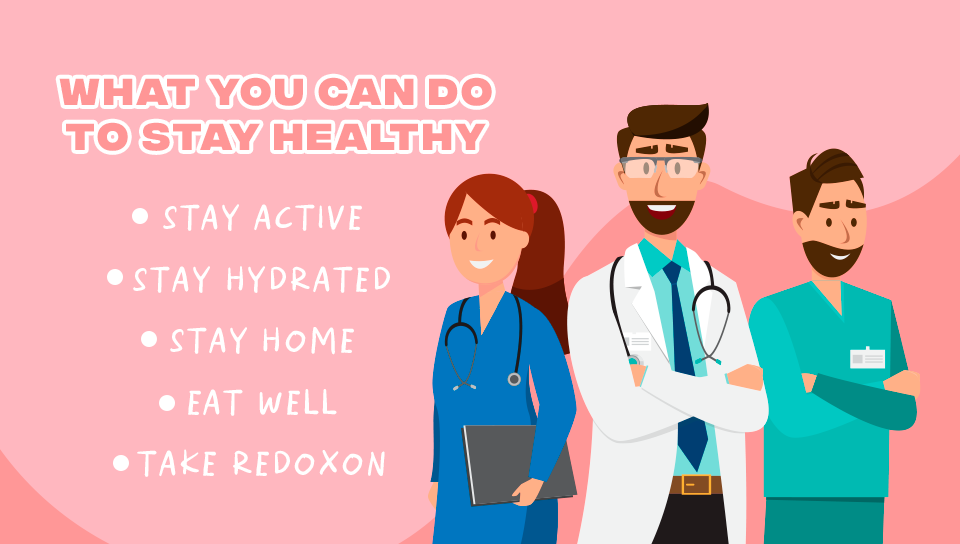10 Things You Should Know About the Vitamin C in Redoxon
Sep 15 2020


The main ingredient in Redoxon® is Vitamin C, but do you know what it’s for and how it can benefit you?
Vitamin C or ascorbic acid is the main ingredient in Redoxon®, and it’s also found in certain foods. Here are 10 things you should know about this essential vitamin.
1. WATER-SOLUBLE
Vitamin C is water-soluble, which means it dissolves in water. Excess amounts of the vitamin leave the body through urine, so we need a constant supply of it. This we have to obtain through our daily diet, since the body can’t produce it on its own, nor can it store it.
2. FOUND IN SOME FOODS
There are plenty of foods that are good sources of Vitamin C if eaten regularly. You can choose from several fruits, including some citrus fruits (oranges, lemons, mandarins, and grapefruits), kiwi, guava, strawberries, melon, and tomatoes. You can also get Vitamin C through broccoli, red or green peppers, and parsley.
However, the Vitamin C content in these foods can diminish by being cooked or stored for a long time, which is why it’s best to eat them as fresh as possible, and, if possible, uncooked.
3. IRON ABSORPTION
Vitamin C helps us to better absorb the iron in our food in order to combat anemia or the risk of developing it.
4. ANTIOXIDANT
It acts as an antioxidant, protecting our cells against the harmful effects of free radicals, which are formed when the body converts food into energy. Other free radicals we’re exposed to come from the environment and include pollution, ultraviolet radiation, and cigarette smoke.
5. COLLAGEN PRODUCTION
Our body needs Vitamin C to produce collagen, which is indispensable in healing wounds and helping to grow and repair tissue throughout the entire body (in the tendons, ligaments, blood vessels, and cartilage), as well as in improving bone health.
6. INFLAMMATION
Some studies suggest that Vitamin C can help reduce levels of C-reactive protein, which is a key indicator of inflammation from bacterial infections or from fungus, diabetes, lupus, rheumatoid arthritis, and osteomyelitis, among others.
7. CARDIOVASCULAR DISEASE
Ingesting enough Vitamin C can help reduce the risk of cardiovascular disease and hypertension, since it helps reduce oxidative stress.
8. EYE HEALTH
Research suggests that Vitamin C, in combination with other nutrients (zinc, vitamin E, and beta-carotene) can delay age-related macular degeneration and vision loss, as well as reduce the risk of cataracts.
9. THE IMMUNE SYSTEM
It helps the immune system function properly to protect the body against illnesses such as the cold, resulting in milder, short-lived symptoms.
10. AT-RISK GROUPS
The people most likely to develop a Vitamin C deficiency are:
- Habitual and social smokers, who need an additional 35mg of Vitamin C per day than those not exposed to cigarette smoke, as the smoke increases the amount of Vitamin C the body needs in order to repair the damage caused by those free radicals
- Babies who are fed evaporated or boiled cow’s milk, since these sources of dairy already contain very little Vitamin C, which the heat can destroy completely
- Those with poor diets low in fruits and vegetables
- People with conditions such as malabsorption (insufficient absorption of nutrients), celiac disease, certain types of cancer, and kidney disease
As you can see, Vitamin C levels impact many important bodily functions, which is why we should be very careful to ingest the necessary amount to meet our daily needs. The effervescence in Redoxon®, along with its mix of Vitamin C + Zinc, allows for easy absorption, making it highly effective at protecting the body from harm.
REFERENCES
- Cardero R.Y., Sarmiento G.R., Selva C.A. (2009). Importancia del consumo de hierro y Vitamina C para la prevención de anemia ferropénica. MEDISAN, 13(6). Retrieved from http://bvs.sld.cu/revistas/san/vol13_6_09/san14609.html
- Chovert, MA. (2013). Medicina Ortomolecular. Editorial Club Universitario.
- MedlinePlus. (2018). Prueba de proteína C reactiva (PCR). Biblioteca Nacional de Medicina de los EE. UU. Retrieved from https://medlineplus.gov/spanish/pruebas-de-laboratorio/prueba-de-proteina-c-reactiva-pcr/
- MedlinePlus. (2019). Vitamina C. Biblioteca Nacional de Medicina de los EE. UU. Retrieved from https://medlineplus.gov/spanish/ency/article/002404.htm
- Office of Dietary Supplements (ODS) (2016). Datos sobre la Vitamina C. National Institutes of Health. Retrieved from https://ods.od.nih.gov/pdf/factsheets/VitaminC-DatosEnEspanol.pdf








